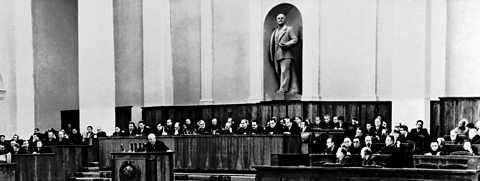Khrushchevãs domestic position
By the late 1950s, Khrushchev was losing support in Russia and there was a lack of confidence in his ability to promote a worldwide communist revolution.
Criticism of Khrushchevãs policies
Khrushchev was under criticism from his own government for his domestic policies. His agricultural programme was a failure and the country was forced to import increasing amounts of wheat from Canada and the United States.
In June 1962, food prices were raised, particularly on meat and butter. This caused major discontent. In the southern Russian city of Novocherkassk unrest escalated to a strike and a revolt against the authorities.
The shortages resulted in bread lines. Reluctant to purchase food in the West but faced with the alternative of widespread hunger, Khrushchev exhausted the nation's hard currency reserves and spent part of its gold stockpile on the purchase of grain and other foodstuffs.
The Secret Speech
Khrushchev was disliked within Russia for his ãSecret Speechã in which he criticised the communist regime and many of its leaders.
Not only did the speech alienate hard-line Stalinists, but it also caused problems abroad. Revolts broke out in Poland and Hungary, damaging the reputation of communism and the USSR.
Although the Berlin Wall had stemmed the flow of refugees, the rhetoric used by Kennedy and other Western leaders criticising the Wall was taking its effect. Propaganda pointing out that the Communists had to imprison citizens in order to keep them living in East Germany was an embarrassment for Khrushchev and the East German government.

Relationship with China
Khrushchev was unpopular with Chinese communists who regarded him as weak and unable to instigate a world-wide communist revolution. Relations between the two nations began to cool in 1956.
Chinese Leader Mao was angered both by the Secret Speech and by the fact that the Chinese had not been consulted about it in advance. He believed de-Stalinisation was a mistake, and a possible threat to his own authority.
When Khrushchev visited Beijing in 1958, Mao refused proposals for military cooperation. When Khrushchev paid a visit to China in September 1959, he was coldly received and left the country on the third day of a planned seven-day visit.
The Soviets had planned to provide China with an atomic bomb, complete with full documentation. But in 1959, amid cooler relations, the Soviets destroyed the device and papers, cancelling the Sino-Soviet Agreement.
Relations continued to deteriorate in 1960, when Chinese leader Peng Zhen mocked Khrushchev, stating that the premier's foreign policy was to blow hot and cold towards the West.
When Cuba requested help from the USSR, Khrushchev needed to be seen to be doing something in support of an endangered communist state. The opportunity to gain a foothold in Latin America opened up the possibility of spreading communism to a new continent.